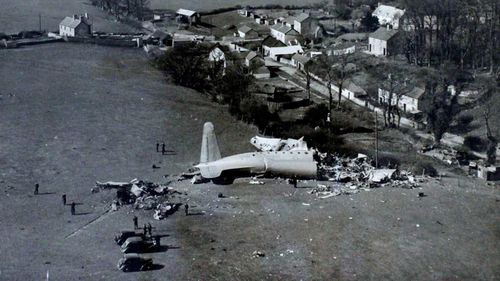Share this @internewscast.com
The world was shocked by the plane crash in India that killed hundreds.
Vishwash Kumar Ramesh was somehow thrown clear when the Air India flight exploded and split in two.
Even more remarkably, Ramesh was able to walk away from the crash with only minor injuries.
It seems like an unthinkable fluke, but Ramesh is not the first person to survive a plane crash through bizarre and surprising circumstances.
Here are some other remarkable plane crash survival stories.
Eighty people were killed in what was then the world’s worst air disaster in 1950.
The plane stalled on landing at Llandow Aerodrome in Wales and broke into pieces on landing.
The Avro Tudor V had been stripped so more seats could be put on board for the trip to watch Wales play Ireland in a rugby international.
Two survivors sitting in the newly installed seats at the tail walked away from the crash unharmed.
The only other survivor was a passenger who was in the toilet as the plane landed. He spent four months in hospital.

The chances of surviving a mid-air plane explosion are so small that it is almost beyond comprehension.
Flying over the Amazon rainforest on Christmas Eve, 1971, a Lockheed L-188A flew into a dark cloud and was struck by lightning.
“Suddenly the noise stopped and I was outside the plane. I was in a freefall, strapped to my seat bench and hanging head-over-heels.
“The whispering of the wind was the only noise I could hear.”

The teen blacked out as she was spinning uncontrollably to the ground, so it is not certain how she survived the landing.
However, navigating through over 30 meters of the dense foliage and branches of the Amazon rainforest canopy decelerated her descent sufficiently so that the final impact wasn’t lethal.
The plane bombing survivor
In 1972, a briefcase bomb detonated on a Yugoslavian aircraft, resulting in 23 passengers and four crewmembers being ejected from the debris. The odds of survival seemed nonexistent.
She fell from a distance of ten kilometres up â no one has ever fallen from that high without a parachute and survived.
An explosion in the baggage department split the plane into several pieces, sucking the passengers and other flight crew out of the plane.

But Vulovic was pinned in the fuselage by a food cart, keeping her in place as it fell to the ground.
Her section of the aircraft landed at an angle on a snowy mountainside in then-Czechoslovakia.
The trees and the snow, as well as the angle of the mountain, made for a softer landing.
Bahia Bakari was a 12-year-old returning from a wedding when the Yemen Airways plane she was in crashed into the Indian Ocean in 2009.
Clinging to wreckage in the pitch black, Bakari remembered hearing cries for help from other passengers.
But when help finally arrived 11 hours later, she was the only one still alive.

Bakari suffered a broken collarbone, a broken hip, burns and other injuries.
But she had no lasting physical injuries.
In December last year, Jeju Air Flight 2216 encountered a crash upon landing after a bird strike. The sole survivors were two flight attendants positioned at the back of the aircraft.
The crash split the fuselage, separating where the attendants were sitting from the remainder of the plane.
But despite the old adage, the rear is not necessarily the safest part of the plane.

“There isn’t any data that shows a correlation of seating to survivability,” says Hassan Shahidi, president of the Flight Safety Foundation said after the crash.
“Every accident is different.”












